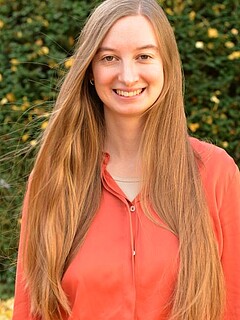PhD students 3rd cohort

Marie Jonietz, M.A.
marie.jonietz@uni-jena.de
Curriculum Vitae
2014-2017 Bachelor of Arts in Folklore/Cultural History and German Linguistics, Friedrich Schiller University Jena
2015-2017 Student assistant at the University Library Jena in the field of manuscripts and special collections
2017-2020 Master of Arts in Subject Didactics/Mediating Culture with focus on Didactics of the German Language and Literature and Didactics of History, University of Augsburg
2018-2019 part-time job as an assistant for a PhD, University of Augsburg
2019-2020 part-time job at Public Relations Department, Staatstheater Augsburg
January 2020-March 2020 Internship at Kulturamt Augsburg, Brechtbüro: Support for the organisation of Brechtfestival 2020
October 2020-March 2021 Volunteer Editorial Staff/Corporate Publishing at mk Medienmanufaktur, Augsburg
April 2021-September 2021 Junior Owned Media Consultant with focus on content/online editing at iProspect/dentsu international
October 2021-December 2022 Freelance editor for denstu Germany GmbH
October 2023-January 2024 Internship at the University Archives of Freie Universität Berlin
October 2021-September 2024 Member of the graduate school “Modell Romantik”
October 2024-March 2025 Research Assistant at FSU Jena
PhD project
Celticism as a Romantic Project – the Irish Revival around 1900
My doctoral project, "Celticism as a Romantic Project – The Irish Revival around 1900," examines the significance of Romantic Celticism in the formation of an Irish national identity. The phenomenon of Celticism emerged within the context of British Romanticism around 1800 and gained widespread popularity across Europe through Macpherson’s Ossian.
Literary works from Irish, Scottish, Welsh, and English Romanticism contributed to the dissemination of Celticist ideas. Approximately a century after its initial emergence, Celticism experienced a revival and reinvigoration during the Irish Revival around 1900. The imagined Celtic identity became a crucial reference point for the burgeoning Irish national identity and was politically charged.
A historical network analysis captures the heterogeneity of the Irish Revival and illustrates the functions that Romantic Celticism fulfilled within its networks. The reference to a shared Celtic past offered inclusive potential in a tense era, during which Irish identity was being renegotiated in terms of language, ethnicity, religion, class, and gender. Celticism, effective in various historical contexts, shaped discussions on literature, art, ethnicity, spirituality, socialism, feminism, militarism, separatism, transnationalism, and anti-capitalism.
During the Irish Revival, Celticism served both as a nostalgic reference to the past and as a source of societal innovation for the formation of a new Irish nation.
Publications
Article
- ‘Dreamers Turned Fighters’: Celticism as an Ideological Foundation for Bloodshed and Self-sacrifice in the Easter Rising. In: “Lost, Unhappy and at Home”: The Impact of Violence on Irish Culture, Volume 2 (Culture). Hrsg.: Maria Gaviña-Costero, Dina Pedro, Donall Mac Cathmhaoill. Peter Lang. [im Erscheinen]
Conference Talks
- „The Easter Rising: Celticism as a Justification for Violence and Martyrdom.” Tagung: „Violence: Repercussion, Resistance and Representation in Irish Society and Culture.” Valencia, 31.05.2023.
- „Celticism as a Romantic Project – the Gaelic Revival around 1900.” Tagung: “XVIIth International Congress of Celtic Studies.” Utrecht, 24.07.2023.
- „Celticism in the Irish Revival – Inventing the Heroic Age.” Tagung: “Time in Nineteenth-Century Ireland.” New York, 29.06.2024.